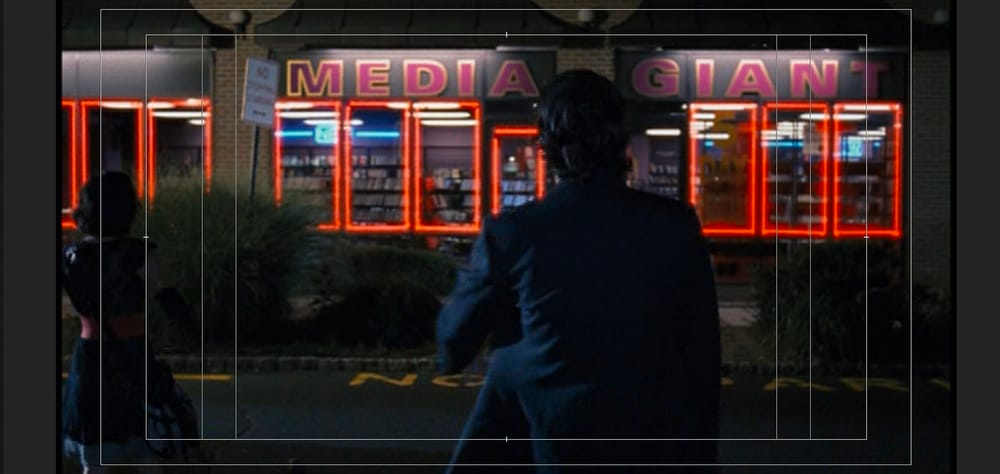It’s rather strange to think of the video store as extinct. For American filmmakers like Alex Ross Perry, the video store’s death knell coincided well before the 2012 release of This Means War; where Reece Witherspoon and Chris Pine’s flirtatious outing in a stripmall video store was already considered a relic of the past; the real store shutting down a month or two after filming.
However, it would take the rest of the world at least a couple more years to catch up. Netflix came to Australia in March of 2015, and with a slow NBN rollout meaning many were still throttling their internet connections on copper wire, streaming wouldn’t reach widespread adoption until the following year. If we weren’t renting DVDs or Blurays, we were certainly still buying them from places like JB Hi-Fi, EzyDVD, or Sanity.
But Videoheaven is not about the video store or even its history in America, instead, it analyses Hollywood’s depiction of it – focusing on the rise and fall of this once great titan of industry in the eyes of filmmakers.
Perry’s dissection of the video store in cinema is engaging purely for its breadth of material. A video in the loosest sense, and an essay in the strictest, the film is at its best when it throws out the obscure film or two. For every clip of Videodrome (1983) or Body Double (1984), he’ll counterbalance them with – and sometimes feature prominently – something like Video Violence (1987) or Remote Control (1988). It not only allows him to roleplay as our local clerk, helping the audience find a hidden gem, it also reemphasises just how important the video store is as a place of curatorship; both onscreen and off. Perry’s affinity for certain topics really shine through when he steps beyond the basic function of the video store. His segment on Troma Entertainment alone would warrant its own essay film, as he fervently builds his case for why the company can simultaneously exist throughout the decades as a note of poor quality, a time-capsule of obsolescence, or even a vanguard of independent filmmaking.
And yet, it becomes frustrating just how many of these enthralling tangents refuse to go any further than the surface. Kid Print, Blockbuster’s offering at the height of stranger danger in the 80’s, gave anxious parents the opportunity to take their child’s mugshot in-store should they ever go missing. After all, there’s the added convenience of being able to return their mountain of overdue tapes. Certainly a clever sight gag, but it’s one that’s over far too quickly. This is just one of the many missed opportunities Videoheaven had available to explore the odd marketing strategies of franchise stores.
Even when the films themselves raise obvious rabbit holes to go down, Perry’s essay feels annoyingly ignorant of them. How strange is it for example, that Jeff Bridges is in three different films where he either regularly visits or works in a video store? Or what about David Spade, whose three separate instances of the irritating clerk stereotype are enough to raise an eyebrow? It may be said that audiences aren’t expected to have commentary where the footage speaks for itself. Like when Maya Hawke talks of “image[s] inside a video store [being] from or about the past” over a clip of her father’s performance in Hamlet (2000), do we need an explanation?
A reasonable question, at least as far as the first twenty minutes are concerned. But when Perry feels it necessary to pad out the rest of the film with an over-analysis of the sour clerk archetype – the snarky, uninviting and often judgemental cashier and abettor of good taste – for the umpteenth time, the film starts to feel like it's ruminating in circles. If we consider the first twenty minutes as the intro to the essay, Videoheaven does establish its arguments and overall thesis. Yet, it can be argued that it does it too well. To the point that the whole essay is contained within these opening moments. Meaning, that without anything additive, the whole three hour exercise becomes so dry, that even Hawke’s voice acting talents (Inside Out 2) are dulled rather significantly.
Three hour film essays are neither uncommon nor unwarranted, but it is rather ironic that the internet, arguably the video store’s executioner, would be home to some of the greatest cultural criticism caught on webcams. As polished as Videoheaven looks to an offline viewer, it’s online where we’re rather spoiled for choice. ‘Video Essays’ are being constantly reinvented on sites like YouTube where equally hyperfixated people with only a fraction of Perry’s budget and without his deep connections in the industry run circles around his film every day. Show Videoheaven to anyone who’s been on YouTube in the last five years, and they’ll tell you it’s not enough to put film clips over a written essay, reverse a few shots, add some title cards and call it a day. If you take a look at something like Patrick H Willems’ Who Is Killing Cinema? (2024), a feature length essay (notably half the length of Perry’s work) filled with fun genre tropes, side characters, and a whole narrative, it’s hard not to see Videoheaven by comparison as a rather impersonal effort.
Despite all of the gripes one might have with a film like Videoheaven, it is still a valuable work. Like the video store itself, the film may seem archaic in comparison to what we is available at the swipe of a screen. But its little nuggets of wisdom, the ones you only find by wading through the film’s many shelves of repeated titles, are always going to be worth taking home with you.
Director: Alex Ross Perry
Narrator: Maya Hawke
Writer: Alex Ross Perry
Producers: Andrew Adair, Daniel Herbert, Jake Perlin, Alex Ross Perry
Editor: Clyde Folley

